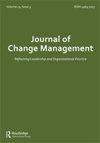Place Leadership in Social Accountability Initiatives
IF 3
Q2 MANAGEMENT
引用次数: 0
Abstract
ABSTRACT This paper explores how social movement and civic actors enact and contribute to place leadership. It does so by examining how social movement organizations in South Africa use social audits to investigate and challenge government accountability and service delivery failures. The paper describes the meaning-making practices evident in social audit reports, and detail how social audit actors construct issues and positions through three framings – rights, regulations and lived realities. In this process, they leverage rights discourses and governance arrangements to legitimize their place leadership, and draw on multiple aspects and experiences of place to expose failures of governance and in the realization of rights. Through the dynamic interplay between legitimizing and exposing, they translate embodied realities and relations in and of place into a sense of purpose and direction for mobilizing a wider network of governance actors. On this basis, the paper contributes a social accountability perspective to place leadership studies. MAD statement This paper aims to Make a Difference (MAD) by exploring how social movement actors contribute to collective place leadership through constructing and contesting the meanings of local governance issues and relationships. The paper highlights how social movement actors illuminate place as the objective and measurable built environment, and as subjectively experienced and constituted as places of heritage and community but also dislocation and trauma. That they use social audits to interrogate governance failures and legitimize communities’ situated knowledge suggests such social accountability initiatives offer a space for place leadership outside of but also interacting with broader governance networks.在社会责任倡议中发挥领导作用
本文探讨了社会运动和公民行动者如何制定和促进地方领导。它通过研究南非的社会运动组织如何使用社会审计来调查和挑战政府问责制和服务提供失败来做到这一点。本文描述了社会审计报告中明显的意义制造实践,并详细介绍了社会审计行为者如何通过权利、法规和生活现实三个框架构建问题和立场。在这个过程中,他们利用权利话语和治理安排使其地方领导合法化,并借鉴地方的多个方面和经验来揭露治理和权利实现的失败。通过合法化和揭露之间的动态相互作用,他们将具体的现实和地方关系转化为动员更广泛的治理参与者网络的目的和方向感。在此基础上,本文将社会责任视角引入地方领导研究。本文旨在通过探索社会运动参与者如何通过构建和争论地方治理问题和关系的意义来为集体地方领导做出贡献,从而产生差异(MAD)。本文强调了社会运动参与者如何将地方作为客观和可测量的建筑环境,以及作为遗产和社区的主观体验和构成的地方,以及错位和创伤。他们使用社会审计来质疑治理失败,并使社区的现状知识合法化,这表明这种社会责任倡议为地方领导提供了一个空间,既可以在更广泛的治理网络之外,也可以与之互动。
本文章由计算机程序翻译,如有差异,请以英文原文为准。
求助全文
约1分钟内获得全文
求助全文
来源期刊

JOURNAL OF CHANGE MANAGEMENT
MANAGEMENT-
CiteScore
6.60
自引率
20.00%
发文量
14
期刊介绍:
Journal of Change Management is a multidisciplinary and international forum for critical, mainstream and alternative contributions - focusing as much on psychology, ethics, culture and behaviour as on structure and process. JCM is a platform for open and challenging dialogue and a thorough critique of established as well as alternative practices. JCM is aiming to provide all authors with a first decision within six weeks of submission.
 求助内容:
求助内容: 应助结果提醒方式:
应助结果提醒方式:


